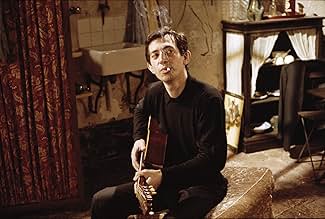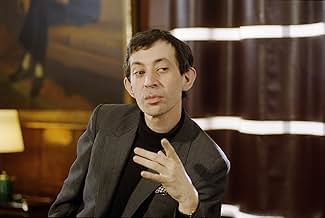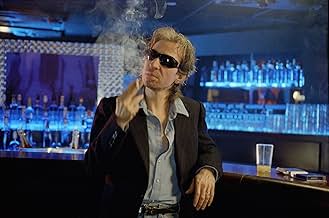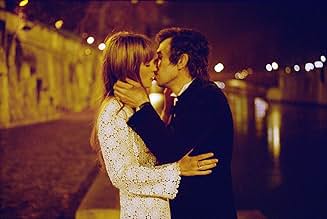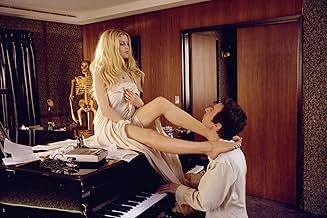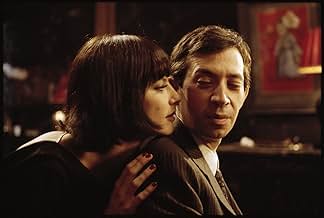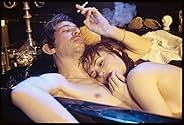AVALIAÇÃO DA IMDb
6,9/10
10 mil
SUA AVALIAÇÃO
Adicionar um enredo no seu idiomaA glimpse at the life of French singer Serge Gainsbourg, from growing up in 1940s Nazi-occupied Paris through his successful song-writing years in the 1960s to his death in 1991 at the age o... Ler tudoA glimpse at the life of French singer Serge Gainsbourg, from growing up in 1940s Nazi-occupied Paris through his successful song-writing years in the 1960s to his death in 1991 at the age of 62.A glimpse at the life of French singer Serge Gainsbourg, from growing up in 1940s Nazi-occupied Paris through his successful song-writing years in the 1960s to his death in 1991 at the age of 62.
- Prêmios
- 7 vitórias e 11 indicações no total
Dinara Drukarova
- Olga Ginsburg (la mère)
- (as Dinara Droukarova)
Avaliações em destaque
There was probably a good few hundred reasons to fail that movie about the life of the most famous french song writer but I was happy to find out the director didn't fall in any of these traps. This movie was poetic, touching, elegant and engaging. Retracing Lucien Ginsburg's life with style and a touch of romanticism, the two hours unfolded so quickly that I was almost surprised when the credits started to roll. From his childhood in Nazi occupied Paris to his encounters with Boris Vian or Les Freres Jacques, from his rise to success with Bardot or Jane Birkin, the story marks all the important moments in the life of this unforgettable composer that has left many generations dazzled by his craftsmanship.
Eric Elmosnino is simply gigantic in this role, conjuring all the greatness of Serge Gainsbourg, letting us get a glimpse of its never seen before talent as well as his fragility. The staging of an alter ego representing his genie, pushing and pulling him to become the man we know is right on the spot to express his inner conflict to choose between painting and music. Music is a minor art, the man used to say as he recorded albums upon albums that are still to this day amongst the most compelling creations in french song writing. Many bits of lyrics used throughout the movie are poking the aficionado in the best way possible.
Avoiding the traps of linear storytelling as it has to respect chronological events, it goes back and forth through time using the protagonist at different periods of his life to put in perspective what goes on in his mind. From young Lucien to l'Homme à Tête de Chou, from the fusion of Serge with his genie to become Gainsbarre, I spent an exquisite moment in the life of a man whose music and lyrical excellence have touched me as a teenager and still remain a defining influence in my life. No need to say the music is beautifully embedded in this graceful biography.
The only minor inconvenience I could point out is Laetitia Casta that plays Brigitte Bardot without an ounce of talent, but fortunately these scenes are short and quickly forgotten. I recommend this film to anyone that has remotely enjoyed Gainsbourg's artwork at any point in his life for it is an amazing and poetic experience you will not regret. It is brilliantly shot and edited with both rhythm and attention to quiet emotional scenes. It takes you up and down with the protagonist's questioning about the meaning of his life and his descent to hell from which he never came back. Thank you Johan Sfar.
Ugliness is in a way superior to beauty because it lasts.
Serge Gainsbourg
(www.radiostationexp.blogspot.com)
Eric Elmosnino is simply gigantic in this role, conjuring all the greatness of Serge Gainsbourg, letting us get a glimpse of its never seen before talent as well as his fragility. The staging of an alter ego representing his genie, pushing and pulling him to become the man we know is right on the spot to express his inner conflict to choose between painting and music. Music is a minor art, the man used to say as he recorded albums upon albums that are still to this day amongst the most compelling creations in french song writing. Many bits of lyrics used throughout the movie are poking the aficionado in the best way possible.
Avoiding the traps of linear storytelling as it has to respect chronological events, it goes back and forth through time using the protagonist at different periods of his life to put in perspective what goes on in his mind. From young Lucien to l'Homme à Tête de Chou, from the fusion of Serge with his genie to become Gainsbarre, I spent an exquisite moment in the life of a man whose music and lyrical excellence have touched me as a teenager and still remain a defining influence in my life. No need to say the music is beautifully embedded in this graceful biography.
The only minor inconvenience I could point out is Laetitia Casta that plays Brigitte Bardot without an ounce of talent, but fortunately these scenes are short and quickly forgotten. I recommend this film to anyone that has remotely enjoyed Gainsbourg's artwork at any point in his life for it is an amazing and poetic experience you will not regret. It is brilliantly shot and edited with both rhythm and attention to quiet emotional scenes. It takes you up and down with the protagonist's questioning about the meaning of his life and his descent to hell from which he never came back. Thank you Johan Sfar.
Ugliness is in a way superior to beauty because it lasts.
Serge Gainsbourg
(www.radiostationexp.blogspot.com)
This is a film that makes no bones about the ultimate squandering of Serge Gainsbourg's talents in a drink - induced decline but at the same time shows the creative and cultural force that his very surname still brings to mind for most French people . The movie brings out particularly well the smoky atmosphere of jazz clubs and gigs where the young Serge first plied his musicality in the 1950s. The phases of his life, from young Jewish boy in occupied France through his creative life and personal life ( for instance )amours with such as Brigitte Bardot and Jane Birkin in the 1960s are dizzily but effectively handled . There is some attempt by Director Sfar to portray Gainsbourg , in late career , as something of an anti- intolerance man of principle but the overall impression given is of an imaginative , somewhat amoral figure whose life was ultimately an example of artistic decline and hedonistic self-indulgence . The film is rather long but, overall , sustains interest well . The main roles are all played well by the actors ,including the female leads Laetitia Casta and the late Lucy Gordon , and the cartoon - like features of the movie , such as Serge's giant alter-ego , impressionistically contribute something positive to the story . Viewers from Anglophone countries who will best remember Gainsbourg as the singing half of the 1969 heavy- breathing pop hit " Je t'aime moi non plus " may still leave the cinema wondering what really was the artistic importance of Serge . Yet they will nonetheless , on the strength of this bio-pic , carry away an image of the principal character as an unforgettable personality .French people , on the other hand , who already regard him as a cultural icon and , in their terms ,as a genius will not need this movie to make up their minds about Serge Gainsbourg .
Lucien 'Serge Gainsbourg' Ginsburg. Artist. Writer. Performer. Alcoholic. Smoker. Rebel. Womanizer. Genius? Joann Sfar's film documents the sporadic lifestyle of the famous French artist Serge Gainsbourg (Eric Elmosnino), whose life contained no boundaries, no objects off limit, and continually tested the patience of those huddled together around him. Beginning with a young Gainsbourg developing his taste for painting aspiring models in Nazi-Occupied France as a mere teenager, the film thereupon concentrates primarily upon his relationships with various beautiful women and his life choices in regards to his ever-changing occupation over his sixty-year-life-span.
What makes this film work so well as a biopic is the truly ingenious performances by both Kacey Mottet Klein (Young Gainsbourg) and Eric Elmosnino (Adult Gainsbourg) who both somewhat beautifully represent such a tragic figure throughout his whole on-screen lifetime. Kacey portrays Gainsbourg as a boy who is maturing faster than those other children around him, so far so, that he explains to one of the schoolchildren the reason that he is good at drawing pubic hairs is because he has had an up-close and personal experience with them before. While he is also shown to be a lonely child, an outcast as Jewish child growing up in Nazi-Occupied France, and thus he develops an affable 'imaginary friend' to keep himself company. Born as small, soft head that watches over young Gainsbourg as he sleeps in the woods to avoid the Nazi soldiers, his only friend soon becomes his worst enemy as he matures into a complicated man. His once pleasant 'imaginary friend' is now a grotesque being with a large nose, long-thin fingers and an affection for cigarettes and bullying Gainsbourg. He continually berates insults, prods and engages Serge, providing the viewpoint that he himself was his harshest critic, and a critic he could not simply dismiss without entire control over his life.
Aside from the performances, the way Sfar allows the films narrative to flow in a temporal manner with no mention of time, or calendar dates, further draws the audience in to Gainsbourg's contrived world. The only way to tell when an event shifts forward in his lifetime, is through his own physical deterioration from old age which is heavily dictated by his excessive abuse of alcohol and tobacco. But as Gainsbourg becomes older, his sexual conquests stay the same age; from Elisabeth (Deborah Grall), to Jane (the late Lucy Gordon), and to an affair with the insatiable Brigitte Bardot (Laetitia Casta), before he eventually settles down with Bambou (Mylene Jampanoi), who would be his final partner. These are all young, vulnerable women who Gainsbourg exploits for his own sexual misgivings, and once they become too old, or too boring, he discards them like a child throwing away an old toy to badger his parents for a new, more expensive model.
Joann Sfar beautifully flowing biopic paints Serge Gainsbourg as a shallow, misogynistic, grumpy old man, who once had dreams of becoming famous for doing anything, but once those dreams were realised, greed and narcissism triumphed over his once forgotten ambitions. Utilizing his gift for writing, artistry and music Gainsbourg chose the route of controversy and scandal over that of happiness and family, which is exemplified in his response to the media after he had a heart attack. When the reporters asked what he will be doing now after such a dangerous and life threatening operation, Gainsbourg calmly asserted to those in attendance that he will "continue to smoke many more cigarettes and drink much more alcohol."
What makes this film work so well as a biopic is the truly ingenious performances by both Kacey Mottet Klein (Young Gainsbourg) and Eric Elmosnino (Adult Gainsbourg) who both somewhat beautifully represent such a tragic figure throughout his whole on-screen lifetime. Kacey portrays Gainsbourg as a boy who is maturing faster than those other children around him, so far so, that he explains to one of the schoolchildren the reason that he is good at drawing pubic hairs is because he has had an up-close and personal experience with them before. While he is also shown to be a lonely child, an outcast as Jewish child growing up in Nazi-Occupied France, and thus he develops an affable 'imaginary friend' to keep himself company. Born as small, soft head that watches over young Gainsbourg as he sleeps in the woods to avoid the Nazi soldiers, his only friend soon becomes his worst enemy as he matures into a complicated man. His once pleasant 'imaginary friend' is now a grotesque being with a large nose, long-thin fingers and an affection for cigarettes and bullying Gainsbourg. He continually berates insults, prods and engages Serge, providing the viewpoint that he himself was his harshest critic, and a critic he could not simply dismiss without entire control over his life.
Aside from the performances, the way Sfar allows the films narrative to flow in a temporal manner with no mention of time, or calendar dates, further draws the audience in to Gainsbourg's contrived world. The only way to tell when an event shifts forward in his lifetime, is through his own physical deterioration from old age which is heavily dictated by his excessive abuse of alcohol and tobacco. But as Gainsbourg becomes older, his sexual conquests stay the same age; from Elisabeth (Deborah Grall), to Jane (the late Lucy Gordon), and to an affair with the insatiable Brigitte Bardot (Laetitia Casta), before he eventually settles down with Bambou (Mylene Jampanoi), who would be his final partner. These are all young, vulnerable women who Gainsbourg exploits for his own sexual misgivings, and once they become too old, or too boring, he discards them like a child throwing away an old toy to badger his parents for a new, more expensive model.
Joann Sfar beautifully flowing biopic paints Serge Gainsbourg as a shallow, misogynistic, grumpy old man, who once had dreams of becoming famous for doing anything, but once those dreams were realised, greed and narcissism triumphed over his once forgotten ambitions. Utilizing his gift for writing, artistry and music Gainsbourg chose the route of controversy and scandal over that of happiness and family, which is exemplified in his response to the media after he had a heart attack. When the reporters asked what he will be doing now after such a dangerous and life threatening operation, Gainsbourg calmly asserted to those in attendance that he will "continue to smoke many more cigarettes and drink much more alcohol."
Serge Gainsbourg was many things: an artist, writer, painter, alcoholic and lover to many. He is a fascinating man who lead a fascinating life and director Joann Sfar makes a great effort here to portray it all. From the early days prior to WWII Gainsbourg was clearly going to amount to something. As he grew older and dabbled here and there in various art forms and dabbled in various women with lovers including Bridgette Bardot and Jane Birkin. Yet as he grew older Gainsbourg dabbled in more drink and drugs and this led to a troubled life.
I was to begin with fascinated by this man, full of charm and wit and ideas abounding. Yet as the film progressed I felt less and less concerned by this man and began wondering when the film might end. As interesting he was, he was also not the nicest of characters, especially in his latter years when he appears to be a drunk and grumpy man. The little touches of fantasy work well to begin with, Gainsbourg's 'imaginary friend' is interesting, but then becomes more and more grotesque and yet more annoying and often blurs the line between realism and surrealism.
Ultimately this has enough to provide an interesting account of someone who had a very full life, but for me it lost it's way part way through and therefore lost it's momentum.
More of my reviews at iheartfilms.weebly.com
I was to begin with fascinated by this man, full of charm and wit and ideas abounding. Yet as the film progressed I felt less and less concerned by this man and began wondering when the film might end. As interesting he was, he was also not the nicest of characters, especially in his latter years when he appears to be a drunk and grumpy man. The little touches of fantasy work well to begin with, Gainsbourg's 'imaginary friend' is interesting, but then becomes more and more grotesque and yet more annoying and often blurs the line between realism and surrealism.
Ultimately this has enough to provide an interesting account of someone who had a very full life, but for me it lost it's way part way through and therefore lost it's momentum.
More of my reviews at iheartfilms.weebly.com
The life story of Serge Gainsbourg had to be filmed, and as he's one of the famous Frenchmen who aren't in fact Belgian, it's only a surprise that it took so long. That his life spanned the Nazi occupation to the rise of Disco would stretch credibility if this were fiction, but as it's all more or less true the director, who is already an accomplished graphic artist, manages to lift it to the level of slightly absurd fiction. Mixing in animation, self-consciously stagey sets and a life-sized puppet as Gainsbourg's dreaded alter ego.
Even the sordid lowlife is given the big treatment, and the early days in the garret look unashamedly glamorous as they would if re-imagined for an opera set or a Salvador Dali dream sequence, as director Joann Sfar lays it on with a trowel.
The episodic nature of the story gives it a rather patchy feel though, and I couldn't help thinking that one or two episodes, especially the cute Hollywood-style musical scene with Brigitte Bardot, could have been shorter. Bardot was just one of the high-profile women Gainsbourg captured, and so was the muse of the existentialists, Juliette Greco.The casting is pretty uncanny with the possible exception of Greco, who was never that model-thin.
Gainsbourg has always been, at least outside France, more famous for being cool than for his music. But his reworking of La Marseillaise which so upset the rightwing patriots of the Seventies was nothing but excellent. I'll go back just to hear that Sly and Robbie riddim one more time.
Quite a substantial feast but it's worth building up an appetite in advance. And of course, you get Jane Birkin and... That Song.
Even the sordid lowlife is given the big treatment, and the early days in the garret look unashamedly glamorous as they would if re-imagined for an opera set or a Salvador Dali dream sequence, as director Joann Sfar lays it on with a trowel.
The episodic nature of the story gives it a rather patchy feel though, and I couldn't help thinking that one or two episodes, especially the cute Hollywood-style musical scene with Brigitte Bardot, could have been shorter. Bardot was just one of the high-profile women Gainsbourg captured, and so was the muse of the existentialists, Juliette Greco.The casting is pretty uncanny with the possible exception of Greco, who was never that model-thin.
Gainsbourg has always been, at least outside France, more famous for being cool than for his music. But his reworking of La Marseillaise which so upset the rightwing patriots of the Seventies was nothing but excellent. I'll go back just to hear that Sly and Robbie riddim one more time.
Quite a substantial feast but it's worth building up an appetite in advance. And of course, you get Jane Birkin and... That Song.
Você sabia?
- CuriosidadesThe project was originally envisioned with Serge Gainsbourg's real life daughter, actress Charlotte Gainsbourg to play him in keeping with the film's surreal and fairytale-esque tone. Six months into rehearsals and preparation Gainsbourg pulled out telling director Joann Sfar, it was proving too emotionally painful and he would have to make his "beautiful film" without her. Sfar had always approached the film with her in mind and was ready to abort the project when fate lead him to Eric Elmosnino.
- Erros de gravaçãoThe young Gainsbourg is shown drawing left-handed, but the adult Gainsbourg becomes right-handed.
- Citações
Serge Gainsbourg: [after a man tips him while he plays the piano] What are you fucking kidding me? I'm not a jukebox!
- Cenas durante ou pós-créditos"Pour Lucy" i.e. this was Lucy Gordon 's last film.
- Versões alternativasEngland is the first territory to release a new cut of the film, running 14 minutes shorter than the previous version and is Joann Sfar's preferred one. Changes include -
- Deletion of the scene where young Serge pleads in vain for his mother to buy him a gun to play with, even attempting to bribe her by saying he'll work harder on the piano. This precedes the scene where he steals the gun from the shop.
- Deletion of the scene where Serge and Boris Vian walk to his apartment and the two lie in the road in an effort to stop a cab. While they wait Serge reveals he has a double that follows him around to which Vian replies his is a werewolf. However two policemen soon cut the conversation short. (This precedes Serge arriving at Boris's apartment and explains a later scene where a drunken Serge lies in the road before having the police escort to his concert)
- Longer scene of the "Baby Pop" groupies, as Gainsbourg wakes up in bed with two naked women as his Mug joyously tosses bank statements at him revealing how rich he is from "Poupée de cire, poupée de son" alone! This is the original lead in to "Qui Est In Qui Est Out".
- The groupies and party to "Qui Est In Qui Est Out" is cut short, removing Serge narrating about "the mouth being the primary sexual organ". His narration reveals the girls in the room he has slept with and how he was with them. It reveals Gainsbourg's occasional cruel streak and precedes the angry neighbor banging on the door.
- After Gainsbourg recites La Marseillaise at the press conference, we then see young Serge repeating it and triumphantly raising his fist to the audience.
- Deletion of a short exchange in the nightclub when a reveller comments to Gainsbourg about him being parodied on a French TV show. The new version removes these lines either because the show is unknown outside of France or because it doesn't tie in as being the night Gainsbourg met his wife Bambou as that TV show wouldn't air until years later. Sfar has said this new version will be the one further released worldwide.
- ConexõesFeatured in De wereld draait door: Episode #5.128 (2010)
Principais escolhas
Faça login para avaliar e ver a lista de recomendações personalizadas
Detalhes
- Data de lançamento
- País de origem
- Centrais de atendimento oficiais
- Idiomas
- Também conhecido como
- Gainsbourg: A Heroic Life
- Locações de filme
- Rue de Verneuil, Paris 6, Paris, França(Gainsbourg's house)
- Empresas de produção
- Consulte mais créditos da empresa na IMDbPro
Bilheteria
- Orçamento
- € 11.500.000 (estimativa)
- Faturamento bruto nos EUA e Canadá
- US$ 233.007
- Fim de semana de estreia nos EUA e Canadá
- US$ 25.189
- 4 de set. de 2011
- Faturamento bruto mundial
- US$ 12.220.456
- Tempo de duração2 horas 15 minutos
- Cor
- Mixagem de som
- Proporção
- 2.35 : 1
Contribua para esta página
Sugerir uma alteração ou adicionar conteúdo ausente

Principal brecha
By what name was Gainsbourg, o Homem que Amava as Mulheres (2010) officially released in Canada in English?
Responda



